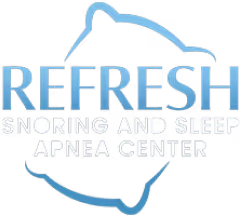Waking up with a swollen uvula, the soft tissue at the back of your throat, can feel uncomfortable and even alarming. While occasional swelling may be due to dry air or dehydration, if it happens frequently, your body might be signaling a deeper issue: disrupted breathing during sleep or undiagnosed obstructive sleep apnea (OSA).
At Refresh Snoring and Sleep Apnea Center, we help patients across Denver and Castle Rock recognize the early signs of sleep disorders and access personalized, effective treatment without the need for a sleep lab or CPAP machine.
Key Takeaways
- A swollen uvula can result from snoring, mouth breathing, or dry air, especially in Colorado’s dry climate
- When chronic, it may be linked to obstructive sleep apnea (OSA)
- Sleep apnea causes airway disruption and tissue irritation that can inflame the uvula
- Related symptoms often include snoring, fatigue, dry mouth, and frequent waking
- At-home sleep testing and CPAP alternatives are available through Refresh Snoring and Sleep Apnea Center
What Is the Uvula, and Why Does It Swell?
The uvula is the small, fleshy extension at the back of your soft palate. It helps guide airflow and plays a minor role in speech and swallowing. It’s also extremely sensitive, prone to inflammation from even mild irritation.
Common causes of a swollen uvula include:
- Dry air or dehydration
- Mouth breathing during sleep
- Snoring or tissue vibration
- Alcohol or spicy food before bed
- Acid reflux or postnasal drip
- Viral illness or allergies
In Denver’s dry, high-altitude environment, uvula irritation is more common than most people realize. But if it happens consistently, especially in combination with snoring or poor sleep, it may indicate a larger airway issue that requires attention.
How Sleep Apnea Contributes to Uvula Swelling
Sleep apnea is a sleep disorder in which the airway becomes repeatedly blocked during sleep, leading to frequent awakenings, snoring, and poor oxygenation. This cycle puts stress on your upper airway, including your uvula.
Here’s how sleep apnea contributes to uvula inflammation:
• Vibration Trauma
Heavy snoring causes repetitive vibration in the soft palate and uvula. This physical stress inflames the surrounding tissue over time.
• Dryness from Mouth Breathing
OSA often forces open-mouth breathing during sleep. In dry climates like Colorado, that air dehydrates the uvula and throat, making them more susceptible to swelling.
• Turbulent Airflow and Pressure
The repeated effort to breathe during apneic events can lead to turbulent airflow and pressure, which irritate and inflame the uvula.
According to the Mayo Clinic, snoring, alcohol use, and nasal obstruction are all potential contributors to uvula swelling, and are also common signs of sleep apnea.
When to Take It Seriously: Symptoms to Watch For
While a swollen uvula by itself may not be a red flag, it can be an early clue when combined with other symptoms like:
- Loud, habitual snoring
- Waking up gasping or choking
- Dry mouth or sore throat in the morning
- Headaches right after waking
- Feeling foggy, unfocused, or exhausted during the day
- Mood swings or irritability
- Frequent nighttime awakenings or tossing and turning
These symptoms often go unnoticed or are brushed off. But together, they may form a pattern that points to untreated sleep apnea.
Need help identifying patterns in your symptoms? Start with our blog on the P.A.L.M. model of sleep apnea causes to better understand the root of your airway issues.
At-Home Remedies for a Swollen Uvula
If you’re dealing with a one-time swelling episode, the following strategies can help:
- Drink more water throughout the day
- Use a humidifier at night, especially during the Colorado winter
- Avoid alcohol and spicy foods in the evening
- Sleep on your side to reduce snoring and airway pressure
- Slightly elevate your head with an extra pillow to reduce reflux
These may offer short-term relief, but if symptoms return or other sleep concerns are present, it’s important to dig deeper.

Why Swollen Uvulas Are a Red Flag in Colorado
At high altitudes like those in Denver and Castle Rock, your airways work harder to stay moist and oxygenated. That added stress, combined with dry air, seasonal allergies, or mouth breathing, can make uvula irritation more frequent.
This environment makes it even more critical to catch the early warning signs of sleep apnea and avoid long-term health impacts like cardiovascular strain or chronic fatigue.
Better Sleep Starts with the Right Evaluation
At Refresh Snoring and Sleep Apnea Center, we help Colorado residents get answers quickly and comfortably:
- No-lab, at-home sleep testing
- Non-CPAP treatment options, including oral appliances
- Custom treatment plans built around your airway, symptoms, and lifestyle
- Supportive care teams in both Denver and Castle Rock
Not sure where to start? Explore our patient results to see what’s possible when you finally get restful, restorative sleep.
FAQs: Swollen Uvula & Sleep Apnea
1. Can a swollen uvula be the first sign of sleep apnea?
A. Yes. While not diagnostic on its own, uvula swelling, especially when chronic, may point to airway disruption caused by OSA.
2. How can I tell if my uvula swelling is serious?
A. If it happens repeatedly, interferes with breathing, or is paired with snoring or fatigue, it’s time to consider a professional evaluation.
3. Do I need to go to a sleep lab for testing?
A. No. We offer at-home sleep studies that allow you to track your sleep and airway function in your own bed.
4. Is CPAP the only way to treat sleep apnea?
A. Not at all. Many of our patients see excellent results with oral appliance therapy, which is quieter, more portable, and often more comfortable than CPAP.
5. Do you treat patients outside Denver?
A. Yes, we serve patients across the Denver metro, Castle Rock, and surrounding areas. Find your nearest location here.
Ready to Understand What’s Causing Your Symptoms?
A swollen uvula may seem minor, but it could be one of your body’s early signs that your sleep isn’t as restful or restorative as it should be.
Whether you're waking up tired, snoring heavily, or simply wondering why your throat feels irritated every morning, the team at Refresh Snoring and Sleep Apnea Center is here to help. With expert care and proven solutions, we’ll help you get to the root of the issue and start sleeping better, starting tonight.

.svg)




